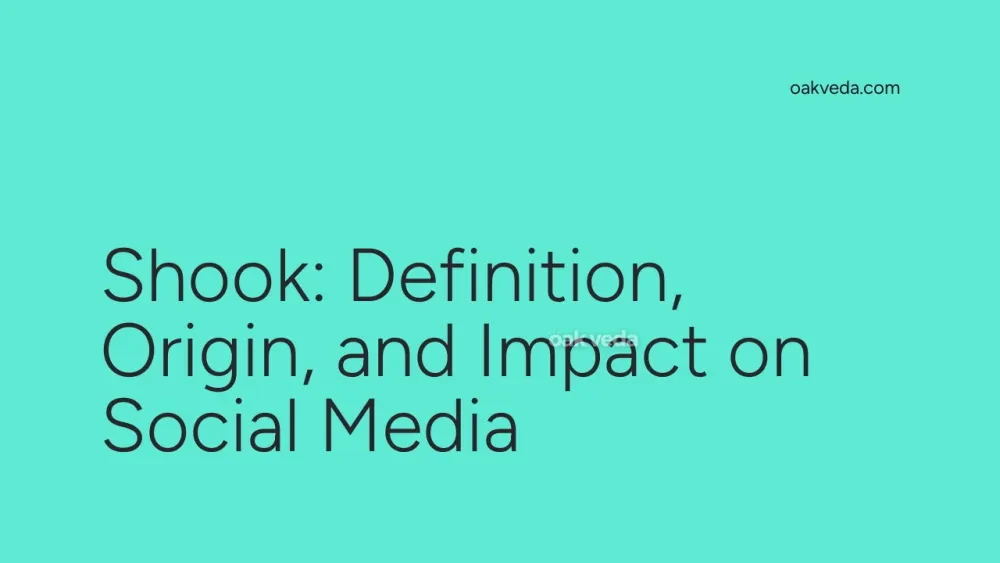
What is Shook?
"Shook" is a popular slang term used extensively on social media platforms to express intense emotions, particularly shock, surprise, or disbelief. When someone says they're "shook," they're conveying that they're mentally or emotionally shaken by an unexpected event or revelation. This versatile term can describe reactions ranging from amazement and excitement to fear and confusion.
Origin and Development of Shook
The term "shook" originated from African-American Vernacular English (AAVE) and has since gained widespread usage across various online communities. Its roots can be traced back to the more formal phrase "shaken up," which has been shortened and adapted for casual, quick communication on social media platforms.
As internet culture evolved, "shook" found its way into memes, tweets, and comments, quickly becoming a staple in the lexicon of young internet users. Its popularity surged in the mid-2010s, coinciding with the rise of platforms like Twitter and Instagram, where brevity and impact in communication are highly valued.
How Shook Works in Online Communication
In social media contexts, "shook" functions as a powerful, concise way to express strong emotions. Users often employ it in the following ways:
- As a standalone response: "Just heard the news. Shook."
- In hashtag form: "#Shook" or "#TotallyShook"
- As part of a longer statement: "That plot twist has me shook!"
The term's versatility allows it to convey a range of intensities, from mild surprise to complete astonishment, depending on the context and accompanying words or emojis.
Popular Examples of Shook in Social Media
- Celebrity news reactions: Fans often use "shook" to express their surprise at unexpected celebrity announcements or scandals.
- Viral video comments: Viewers might describe themselves as "shook" after watching a particularly impressive or shocking video.
- Sports upsets: When underdogs win major competitions, supporters and neutrals alike often declare themselves "shook" by the unexpected outcome.
- Political events: Surprising election results or political decisions frequently elicit "shook" responses from social media users.
Impact of Shook on Social Media Culture
The widespread adoption of "shook" has significantly influenced online communication styles. Its impact includes:
- Emotional expression: "Shook" provides a quick, relatable way to convey complex emotions in a fast-paced digital environment.
- Community building: The term helps create a sense of shared experience and understanding among social media users.
- Meme culture: "Shook" has become a central element in many memes, further cementing its place in internet culture.
- Language evolution: Its popularity demonstrates how internet slang can rapidly enter mainstream usage.
How Brands and Influencers Use Shook
Savvy brands and influencers have recognized the power of "shook" in connecting with younger audiences:
- Reactive marketing: Brands use "shook" in their social media posts to appear trendy and relatable.
- Product launches: Companies might describe customers as being "shook" by new product features or designs.
- Influencer content: Many influencers incorporate "shook" into their vocabulary to maintain an authentic, youthful persona.
- Engagement strategies: Brands may ask followers to share what has them "shook" to boost interaction and user-generated content.
Future Trends Related to Shook
While "shook" remains popular, language on social media evolves rapidly. Future trends may include:
- New variations: We might see adaptations like "ultra-shook" or "shooketh" gaining traction.
- Cross-language adoption: As global internet culture grows, "shook" could be adopted and adapted in non-English speaking communities.
- Potential decline: Like many internet trends, "shook" may eventually be replaced by newer slang terms.
- Academic interest: Linguists and sociologists may study "shook" as a case study in the rapid evolution of language in the digital age.
FAQs about Shook
-
Is "shook" grammatically correct? While not standard English, "shook" is widely accepted in informal, online communication.
-
Can "shook" be used in professional settings? It's generally best to avoid using "shook" in formal or professional contexts, as it's considered casual slang.
-
Is "shook" only used by younger people? While more common among younger users, people of all ages familiar with internet culture may use the term.
-
Are there any negative connotations to using "shook"? Generally, "shook" is neutral, but overuse might be seen as trying too hard to appear trendy.
-
How is "shook" different from "shaken"? "Shook" is more informal and often implies a stronger emotional response than "shaken."
In conclusion, "shook" has become a significant part of social media language, offering users a powerful, concise way to express intense emotions. Its journey from AAVE to mainstream internet slang illustrates the dynamic nature of language in the digital age. As social media continues to shape how we communicate, terms like "shook" serve as fascinating examples of linguistic evolution in real-time.
You may be interested in:
- Brand Advocate: Definition, Origin, and Impact on Social Media
- Put on Blast: Definition, Origin, and Impact
- Alt-Text: Definition, Origin, and Impact on Social Media
- Terms of Service (ToS): Definition, Origin, and Impact
- Referral Traffic: Definition, Origin, and Impact
- Fam: Definition, Origin, and Impact on Social Media

